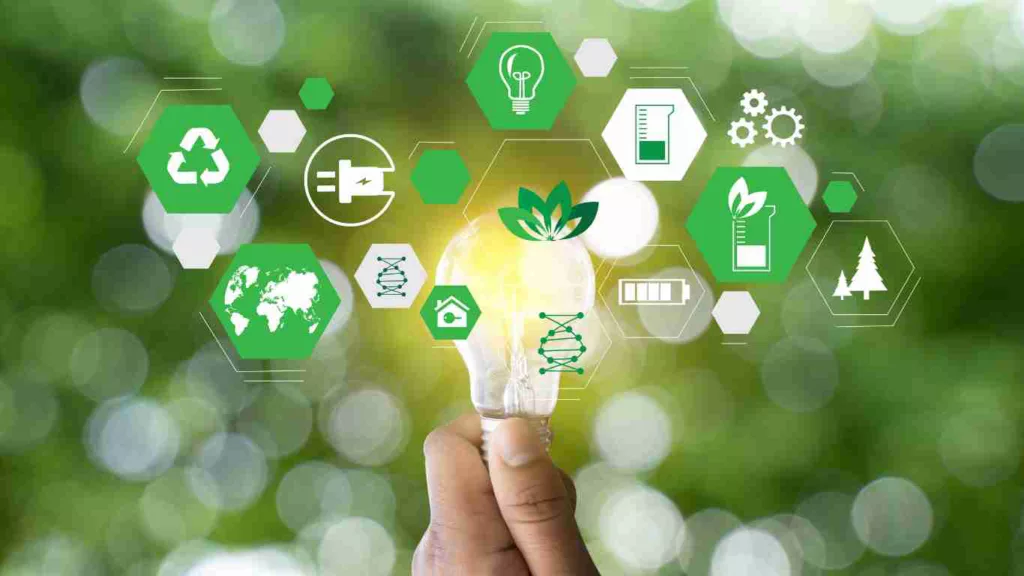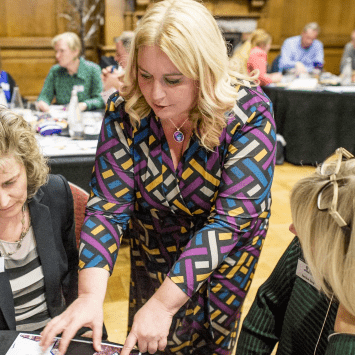Posted in Blog, Eco-innovation, Entrepreneurship, Innovation, Sustainability by Jo North
Sustainable Entrepreneurship: A Comprehensive Guide
What is Sustainable Entrepreneurship?
Sustainable entrepreneurship is the practice of starting and managing businesses that prioritize and integrate economic growth, environmental stewardship, and social responsibility. It’s about ensuring long-term value and benefits for both current and future generations.
Sustainable Entrepreneurship’s Role in Environmental and Social Challenges
Holistic Approach
Integrating the Three Pillars
Unlike traditional businesses focused solely on profit, sustainable entrepreneurship encompasses the three pillars: economic, environmental, and social dimensions, promoting responsible decision-making.

Environmental Preservation
Innovative Solutions for a Healthy Planet
Sustainable entrepreneurs create products and processes that reduce waste and carbon footprints, combatting environmental degradation.
Job Creation and Wealth Distribution
Equitable Economic Growth
By prioritizing local sourcing and community ventures, sustainable businesses often offer jobs in underserved areas, ensuring a fairer wealth distribution.
Empowerment and Social Inclusion
Elevating Marginalized Communities
Addressing core social issues, sustainable entrepreneurship empowers underrepresented groups, enhancing their life quality.
Long-term Growth and Resilience
Beyond Short-term Gains
Businesses grounded in sustainability principles can better navigate global challenges, contrasting with short-term profit-driven entities.
Shift in Consumer Behavior
Meeting Modern Demands
With consumers valuing responsibility, sustainable businesses cater to this evolving demand, influencing broader market dynamics.
Innovative Solutions for Pressing Challenges
Breaking Ground with Novel Ideas
By tackling environmental and social problems head-on, sustainable entrepreneurs often develop pioneering technologies and business models. These create ripple positive effects beyond their immediate sphere.

Historical Perspective on Sustainable Entrepreneurship
The Shift from Short-Term Focus
Before the rise of sustainable entrepreneurship, many businesses primarily eyed immediate gains. Their strategies revolved around quick returns, often sidelining environmental or social impacts.
Evolution to Sustainable Practices
As awareness grew about the finite nature of our planet’s resources and the urgent social challenges we face, there was a noticeable tilt. Businesses began to recognize the importance of blending profit with purpose. This marked the transition from being short-term profit machines to entities valuing sustainable business practices.
Trailblazers in Sustainable Entrepreneurship
In the past, while the majority were profit-driven, some entrepreneurial ventures were ahead of their times. They not only sought profit but also aimed to make a positive impact.
Muhammad Yunus: Social Business Pioneer
Originating from Bangladesh, Muhammad Yunus introduced the concepts of microcredit and microfinance. He founded the Grameen Bank, which offers small loans to impoverished entrepreneurs. Yunus’s approach to social business has empowered millions, especially women, to break free from the cycle of poverty.
Wangari Maathai: Environmental Crusader
Hailing from Kenya, Wangari Maathai founded the Green Belt Movement. This grassroots initiative encouraged communities to plant trees, combatting deforestation and empowering women. Maathai’s endeavors bridged the gap between environmental sustainability and community development.
Eileen Fisher: Sustainable Fashion Visionary
From the United States, Eileen Fisher transformed the fashion industry with her eponymous brand. Her commitment to organic materials, ethical manufacturing, and recycling has set new standards in an industry often criticized for wasteful practices.
Vinod Khosla: Green Tech Enthusiast
Born in India, Vinod Khosla is a venture capitalist who heavily invests in green technology startups. His support has spurred innovations in renewable energy, waste management, and sustainable agriculture.
Shiza Shahid: Advocate for Social Change
Of Pakistani origin, Shiza Shahid co-founded the Malala Fund with Nobel laureate Malala Yousafzai. The organization champions girls’ education worldwide. Shahid’s other ventures also emphasize social entrepreneurship and empowerment.
Foundations for Modern Sustainability
These types of early stage entrepreneurial activities, whether they focused on ethical sourcing, fair trade, or green technologies, set important precedents. They laid the foundation for today’s sustainable businesses, showing that profit and purpose can, and should, coexist. Today it’s more important than ever that every innovation should be an eco-innovation.

Investors Embracing Sustainable Entrepreneurship
Understanding the Shift
As the global landscape changes, so do investor priorities. Today, more investors are identifying sustainable businesses as not only ethically sound but also as smart financial moves. They recognize that companies with sustainable practices often have a lower risk profile and greater long-term viability.
Today’s investors, be it individuals or massive institutions, understand that sustainable business models offer more than just good PR. They represent a forward-thinking approach, resilience in the face of global challenges, and a long-term commitment to both profit and planet.
Why Investors Care
Risk Management
Sustainable business models often consider environmental, social, and governance (ESG) factors, which can mitigate potential business risks. For instance, a company that adheres to strict environmental standards is less likely to face regulatory fines or public backlash.
Future-Proofing Investments
Businesses that prioritize sustainability are often better positioned to adapt to changing regulations and consumer preferences. This adaptability can translate to longevity and consistent returns.
Aligning with Values
Many modern investors, especially younger generations and institutional investors, want their money to reflect their values. They’re choosing to back businesses that contribute positively to society and the environment.
Sustainable Entrepreneurship: Notable Investors and Institutions
BlackRock’s Sustainability Push
Larry Fink, CEO of BlackRock, the world’s largest asset manager, has been vocal about the importance of sustainability. In his annual letters to CEOs, Fink emphasizes that sustainable investing is the strongest foundation for client portfolios.
Norway’s Sovereign Wealth Fund
The world’s largest sovereign wealth fund, owned by Norway, has made sustainability a central part of its investment strategy. It often divests from companies that don’t meet its environmental and ethical standards.
Venture Capitalists Joining the Movement
Prominent venture capitalists, once solely driven by high returns, are increasingly funneling money into green tech startups, sustainable food companies, and other eco-friendly ventures.
Technology Advancements: Powering Sustainable Entrepreneurship
Technology, in its myriad forms, is proving to be an invaluable ally to sustainable entrepreneurship. By offering tools and solutions that align profitability with ecological responsibility, it’s paving the way for a new era of business that respects both the planet and its people.
Here are some examples below. If you’d like a more in-depth look, you’ll find a more detailed article here on net zero innovation and sustainable business.
Smart Energy Solutions
One of the most transformative technological advancements in recent years has been in the realm of renewable energy. Solar panels and wind turbines have become more efficient and affordable. This has led to businesses, both big and small, adopting these green energy sources, reducing their carbon footprints and energy costs simultaneously.
Waste Management and Recycling Innovations
Advanced recycling technologies are revolutionizing waste management. For instance, innovations in plastic recycling now allow for the breakdown and repurposing of previously non-recyclable plastics. Entrepreneurs are leveraging these advancements to create businesses centered on circular economy principles, ensuring waste is minimized, and resources are reused.
Data Analytics for Resource Efficiency
Data-driven insights are guiding businesses to be more resource-efficient. Sophisticated software can now analyze a company’s operations in real-time, pinpointing areas of waste or inefficiency. By acting on these insights, businesses can optimize their processes, leading to reduced resource use and enhanced sustainability.
Sustainable Agriculture Through Precision Farming
Agricultural ventures are benefiting from technologies like drones and IoT (Internet of Things) devices. These tools help farmers monitor crop health, soil moisture, and pest activity with precision. The result? Higher yields, fewer chemical inputs, and farming practices that are in tune with nature.

Key Concepts in Sustainable Entrepreneurship
Corporate Social Responsibility (CSR) in Business Development
CSR is a self-regulating business model where companies aim to be socially accountable. Through CSR, businesses voluntarily integrate social and environmental concerns into their operations. This often leads to enhanced brand reputation, stronger community ties, and increased customer loyalty, aiding in holistic business development.
Sustainable Business Model versus Traditional Models
A sustainable business model is designed with environmental, social, and economic factors in balance. Unlike traditional models that prioritize profit, sustainable models consider the long-term impact on all stakeholders, from the environment to local communities. While traditional models often focus on immediate gains, sustainable models emphasize resilience, adaptability, and longevity.
The Influence of the Circular Economy on Production
The circular economy promotes resource efficiency by ensuring products and materials are reused and recycled. Instead of the ‘take, make, dispose’ linear approach, it champions a loop where materials return to the cycle. This approach profoundly impacts production processes by reducing waste, conserving resources, and driving innovation in product design.
Social Enterprise and Non-Profit Organisations: Harnessing the Entrepreneurial Spirit
Social enterprises and non-profit organisations are driven by missions to address societal or environmental challenges. While their primary goal isn’t profit, they embody the entrepreneurial spirit by innovating and adapting to achieve their objectives. They blend business techniques with a desire for change, demonstrating that entrepreneurship can be a powerful tool for social good.
Environmental Concerns in Entrepreneurship
Entrepreneurial Action: A Shield Against Environmental Harm
Entrepreneurs have a unique ability to drive change. By launching initiatives, products, or services that directly counteract environmental degradation and climate change, they play a pivotal role in creating solutions. Their agile nature allows them to innovate and adapt quickly, offering timely remedies to pressing environmental challenges.
Environmental Values Steering Business Strategy
In today’s landscape, environmental values aren’t just ethical stances; they’re strategic imperatives. Companies that embed these values into their core strategies tend to have better stakeholder relationships, reduced regulatory risks, and enhanced brand reputation. Integrating environmental considerations ensures a business remains relevant and resilient in a rapidly changing world.
Case Studies: Environmental Champions in the Business World
Patagonia’s Ethical Drive
Outdoor apparel brand Patagonia is renowned for its dedication to the environment. From using recycled materials to supporting grassroots activists, their commitment showcases how a company can be both profitable and a force for environmental good.
Interface’s Mission Zero
Interface, a modular flooring company, embarked on ‘Mission Zero‘ with a goal to have no negative impact on the environment by 2020. Through innovative product design and sustainable sourcing, they’ve set new industry standards.
Tesla’s Clean Energy Ambition
Tesla is not just an electric car manufacturer. Its broader mission is to hasten the world’s move to sustainable energy. By producing solar products and energy storage solutions, Tesla directly addresses the challenges posed by climate change.
Entrepreneurship provides a powerful platform to tackle environmental concerns head-on. As showcased by numerous businesses, integrating environmental values and taking proactive measures not only mitigates harm but can also pave the way for a brighter, sustainable future.

Economic Development and Growth Through Sustainable Entrepreneurship
Fueling Regional and Global Economies
Sustainable entrepreneurship isn’t just about the environment; it’s a significant economic driver. By focusing on long-term viability and community engagement, sustainable enterprises stimulate local economies, create jobs, and can even influence the broader global economic landscape.
New Markets Born from Sustainable Innovation
As the world shifts towards sustainability, fresh markets emerge. Innovations in renewable energy, sustainable agriculture, and green technologies introduce new products, attracting consumers and investors alike. These markets not only diversify the economy but also cater to a growing demand for eco-friendly solutions.
Sustainability Entrepreneurship: A New Economic Value Paradigm
Economic value isn’t solely derived from profits. Sustainability entrepreneurship highlights that value also lies in resource conservation, societal well-being, and environmental protection. Companies that embrace this holistic view often enjoy enhanced reputation, customer loyalty, and stakeholder trust.
Balancing Immediate Gains with Future Prosperity
While short-term profits are essential for business survival, an exclusive focus on them can jeopardize future success. Sustainable businesses understand that long-term value—like investing in renewable resources or community development—ensures resilience and continuity.
Economic growth and development don’t have to come at the planet’s expense. Sustainable entrepreneurship showcases how businesses can thrive economically while also fostering a healthier and more equitable world.
Societal Impact Through Sustainable Entrepreneurship
Sustainable Enterprises: Catalysts for a Better Society
Sustainable enterprises extend their influence beyond profit margins. They engage with and uplift civil society by fostering community partnerships, supporting local initiatives, and prioritizing ethical operations. Through these actions, they weave a fabric of shared progress and societal betterment.
Driving Social Development and Equality
Entrepreneurial ecosystems have the power to shape societal norms and values. By prioritizing sustainable and inclusive practices, these ecosystems contribute to social development, empower marginalized communities, and work towards reducing systemic inequalities. Their collective efforts ensure a fairer playing field for all.
Small Business, Big Impact
While large corporations often steal the spotlight, small businesses play a vital role in societal transformation. Their close-knit relationship with local communities positions them uniquely to understand and address specific needs. By adopting sustainable practices, they pave the way for improved quality of life, not just for current communities, but also for future generations.
The societal impact of sustainable entrepreneurship is profound. By intertwining economic goals with societal well-being, these enterprises and businesses lay the groundwork for a harmonious, prosperous, and inclusive future.
Emerging Trends and Innovations in Sustainable Entrepreneurship
The Power of Sustainable Products
Sustainable products are more than just eco-friendly alternatives; they’re reshaping industries. As consumer awareness grows, the demand for these products rises, leading to new income sources and fresh opportunities for entrepreneurs. The ripple effect? An economic landscape where sustainability and profitability go hand in hand.
Tech Pioneers in the Bay Area
The Bay Area, a tech hub, is home to a new breed of entrepreneurs who combine tech prowess with a passion for sustainability. These tech entrepreneurs leverage their deep industry knowledge to craft solutions that are both cutting-edge and environmentally sound, setting new standards for innovation. In 2023, for example, tech company ClimateAI was awarded 2023 Technology Pioneer by the World Economic Forum.
New Technologies: The Frontier of Sustainable Innovation
Advancements in technology continuously unlock doors for sustainable innovation. From renewable energy solutions to biodegradable materials, new technologies are pushing the boundaries of what’s possible. As they evolve, they offer promising avenues for entrepreneurs keen on making a mark without leaving a carbon footprint.
The world of sustainable entrepreneurship is dynamic, shaped by evolving trends and groundbreaking innovations. As products, technologies, and entrepreneurial visions converge, the future promises a business landscape that’s not only prosperous but also profoundly responsible.
Challenges and Opportunities in Sustainable Entrepreneurship
Structural Overhaul for Natural Resources
While our planet’s bounty may seem vast, natural resources are finite. To ensure their longevity, deep-seated structural changes in industries and economies are crucial. This transformation, although challenging, opens doors for innovative approaches and sustainable methods, turning obstacles into avenues of opportunity.
The Delicate Act of Balancing Growth and Environment
Economic growth, a hallmark of progress, often comes with environmental costs. The challenge lies in striking a balance where growth doesn’t equate to environmental degradation. By reimagining processes, practices, and objectives, entrepreneurs can tap into opportunities where growth complements, not compromises, environmental health.
Entrepreneurial Resilience Amid Sustainable Entrepreneurship Challenges
Sustainability issues can be daunting, testing the mettle of even the most committed entrepreneurs. But it’s their intentions and behavior—how they react, adapt, and innovate—that determine success. By staying rooted in purpose and maintaining agility, entrepreneurs transform challenges into catalysts for change.
The road to sustainable entrepreneurship is dotted with challenges, but it’s also paved with immense opportunities. By addressing these head-on and harnessing the potential they offer, businesses can carve a future that’s not only profitable but also positive and progressive.
Innovation Ecosystems and Sustainable Entrepreneurship
Knowledge Exchange
A thriving innovation ecosystem promotes the exchange of idea and knowledge. Entrepreneurs can tap into shared knowledge, accelerating the development of sustainable solutions.
Collaborative Ventures
Within these ecosystems, businesses often collaborate. Joint ventures can pool resources, fostering quicker adoption of sustainable practices.
Access to Capital
Innovation hubs attract investors interested in groundbreaking ideas. Sustainable startups in these spaces can more easily secure funding to grow.
Mentorship and Training
These ecosystems often provide mentorship programs. Experienced leaders guide budding entrepreneurs, ensuring their sustainability vision is effectively executed.
A thriving innovation ecosystem is a bedrock for sustainable entrepreneurship, offering resources, connections, and knowledge that can be pivotal in steering sustainable ventures to success.
Zooming in on Core Businesses
Many mainstream businesses, once known for traditional practices, are now embracing sustainability. By integrating eco-friendly methods and ethical standards into their operations, they’ve shown that the transition to sustainability is not just possible but also profitable.
Spotlights: New York and Beyond
New York, a bustling hub of commerce, offers a rich tapestry of sustainable business stories. From startups focusing on green technologies to established firms overhauling their practices, the Big Apple’s case studies are a testament to sustainable business’s transformative power. This movement isn’t confined to New York. Regions globally are witnessing a surge in businesses making positive environmental and social impacts.

Sustainable Innovation in the Water Sector
For an example of sustainability in a specific sector, take a read of my article: Sustainable Innovation in the Water Industry.
The Way Forward in Sustainable Entrepreneurship
Entrepreneurial Spirit: Navigating 21st Century Challenges
The complexities of the 21st century demand solutions that are both innovative and sustainable. At the heart of this change lies the entrepreneurial spirit. It’s this drive, vision, and determination that positions entrepreneurs to tackle significant challenges head-on, making them essential players in forging a brighter future.
Sustainable Entrepreneurship Practices: A Magnet for Customer Loyalty
In today’s market, customers seek more than just products; they’re in search of brands they can trust. Sustainable practices are no longer just ‘nice-to-haves’; they’re pivotal in building and retaining customer loyalty. Businesses that prioritize sustainability resonate more deeply with consumers, fostering a bond that goes beyond transactions.
A Dual-Value Approach to Entrepreneurship
The essence of modern entrepreneurship lies in its duality. It’s not just about economic gains; it’s also about making a positive societal mark. Encouraging entrepreneurial behavior that values this dual approach ensures that businesses thrive while also making meaningful contributions to society.
Sustainable Entrepreneurship: Final Thoughts
As we navigate the intricate landscape of the 21st century, sustainable entrepreneurship emerges as a beacon. It holds the promise of a world where businesses prosper, not at the expense of society or the environment, but in harmony with them. The journey ahead is challenging, but with entrepreneurial spirit and commitment, it’s a journey worth starting.
If you’d like some practical tips on how you can create and develop a more sustainable business, take a look at my article here.
You’ll also find my article here on Inclusive Innovation for Sustainable Entrepreneurship helpful, too.


